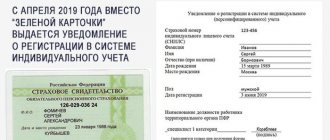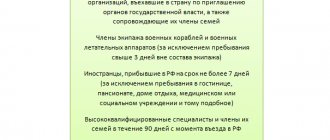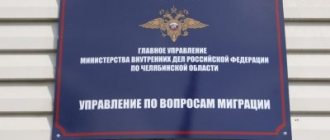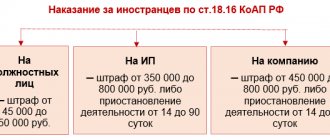Every foreign citizen who arrives in Russia must register at his place of residence or place of residence. To do this, you need to contact the migration authorities in person or through the receiving party. This procedure is not particularly difficult. In 2021, for lack of registration under Article 322.2 of the Criminal Code of the Russian Federation, criminal liability is provided.
Form notification of the arrival of a foreigner in Russia
To register, it is enough to make copies of the documents with which the foreigner arrived in the Russian Federation and send them to the Federal Migration Service along with the notification of arrival. Notification of the arrival of a foreign citizen in the Russian Federation can be downloaded here.
However, even here there are many violations, and one of them is fictitious registration of foreign citizens. The detailed text of Article 322.2 of the Criminal Code of the Russian Federation can be found here.
Amount of fine and possibility of criminal prosecution
Criminal liability for fictitious registration is established in paragraph 2 of Article 322 of the Criminal Code. This norm establishes the following types of sanctions for those responsible:
Punishment in the form of a fine, which can range from 100,000 to 500,000 rubles.
- The same article of the Criminal Code provides for the recovery from the offender of his earnings or other income for the last 3 years as punishment.
- Violators can also be sentenced to forced labor for up to three years. In addition, he may be prohibited from holding any positions or engaging in certain types of activities.
- The most severe type of punishment is imprisonment. Its maximum term can be three years.
However, this article of the Criminal Code contains a note. It states that a person can be released from prosecution if they help solve the crime. True, his actions should not contain another crime.
Why are there difficulties with registration?
Registration at the place of residence can be either permanent or temporary. As a rule, foreign citizens receive registration of the second type. Its duration depends on the purposes and for how long the traveler from abroad arrived in Russia.
The minimum period for temporary registration is a month (although it happens that a guest asks to register for only a few days), and the maximum is limited to five years.
When a foreigner stays at a hotel or the inviting company handles his migration registration, problems usually do not arise. If a foreign citizen is staying with private individuals, they often refuse to register him at his place of residence.
This can be caused by various reasons. It's no secret how often real estate scams occur, and people are simply afraid: of becoming victims of fraud.
Some people simply don’t want the extra hassle, because the homeowner will have to go with the migrant to the Federal Migration Service and be present when submitting the application.
The application for a temporary residence permit can be downloaded on our website.
In such a situation, a foreign citizen begins to look for alternative options. And if there is demand, there will be supply: especially clever Russians began to offer such a service as fictitious registration of a foreign citizen. For the time being, no one thinks about punishment, however, if the deception is revealed, very severe penalties will follow.
Conclusions and discussions
Once again, I want to remind you that language is your enemy! Never say that you registered a person formally. In extreme cases, say that you were registered for the purpose of residence, a place was provided, the person spent one night, and then moved out for objective reasons. And the best thing is, in any situations that you do not understand, when communicating with law enforcement agencies, do not rush to give evidence, but use Art. 51 of the Constitution of the Russian Federation and do not testify against yourself (at least until you talk to a lawyer and he will formulate the correct position on the case for you).
Which registration is fictitious
Regular registration takes a minimum of time and poses virtually no threat to the homeowner. It consists in the fact that both the owner of the property and the foreigner must appear together at the migration authorities.
The first one must have a passport and a document confirming the right of ownership of the property. The foreigner presents an identity card and a migration card.
This is what a registration stamp looks like in the Russian Federation
The owner of the living space submits a corresponding application to the GUVM, and his guest receives a temporary registration stamp. At this point the procedure is considered complete. If it is followed correctly, a foreign citizen can apply for a labor patent. In this case, the place in which the migrant lives and his registration address must be identical.
If the owner does not want to register a new tenant, it is worth remembering that fictitious registration of a foreign citizen at the place of residence is subject to not only administrative, but also criminal liability.
In such cases, it is better not to take risks and look for other housing, the owners of which will be more accommodating.
But first you should try to convince the owner that temporarily registering another person in your living space does not threaten him with anything. At the end of its validity period, there is no need to go anywhere; the foreigner will be deregistered automatically.
By submitting an application, the owner simply notifies the migration authorities that other people are temporarily registered in his apartment.
The following cases fall under the concept of fictitious registration:
- When a person knowingly provides false information or fake documents.
- When a foreigner registered at his place of stay, the owner of the premises did not intend to provide him with his housing.
- If a migrant registered at his place of stay, although he knew that he would not live there.
For fictitious registration of foreign citizens, the fine is from 100,000 to 500,000 rubles.
Punishment for fictitious registration of foreign citizens in this case is borne by both: the migrant and the one who registered him. An official who allowed a fictitious registration will not be able to avoid it either, if it is established that this happened intentionally.
Methods of proof
In order for the person who issued the false registration to be held accountable, it is necessary to prove his guilt in court. In practice, it is extremely difficult to do this and prove that the citizen does not live in the apartment for which he registered.
Persons who may report dishonest registrants may include:
- Neighbors who discovered that many more people were registered in the neighboring apartment than were actually living;
- Employees of the Federal Migration Service;
- District; To avoid administrative or even criminal liability, it is strongly recommended to register in accordance with all the rules.
So, if in the city you arrived in, you do not have relatives, friends or acquaintances who could at least temporarily register you with them, do not despair and go to “extreme measures”. It is possible to register on a temporary basis:
- In the hotel complex;
- From your employer;
- In a rented apartment at the request of the owner;
Where and how you can make a temporary registration, read here.
Penalties for fictitious registration
Despite the strict punishment, thousands of such cases are observed in Russia every year. It is reckless to hope that they won’t get caught: unlike some other government agencies, Russian migration authorities work perfectly.
Employees often conduct raids, and neighbors often report the possible presence of illegal residents.
In identifying illegal immigrants, they have the right to use a variety of measures: checking against registration databases, requesting documents on rental housing, interviewing all suspects, as well as forensic examination of documents.
All this makes it possible to identify the fictitiousness of registration, if it took place. So before you decide to take such a risky step, you need to know what the risks are.
How to check if the registration procedure has been followed
Despite the large number of violations, there are a lot of conscientious foreign citizens living in Russia. Often people are interested in how to check whether the registration is fictitious and whether the guest is registered at all.
The best way to avoid trouble is not to contact various fly-by-night companies that advertise on the Internet with offers to quickly obtain temporary or even permanent registration.
There are a huge number of cases where people who are already in a difficult situation have lost their last money due to such extortionists. The employer, hotel administration or owner of the accommodation where the foreign guest is staying must register.
Certificate of temporary registration
In this case, the migrant must be given a certificate of temporary registration, which specifies its validity period. If you still have doubts, you need to ask to know which department of the Main Directorate for Migration Affairs the representatives of the receiving party contacted.
Of course, officials will not provide such information over the phone, but it’s worth taking a little time and going there in person. Since many issues are now resolved through the MFC and the State Services portal, the queues at migration departments have become much shorter.
Who initiates the review?
Registration verification is carried out on the initiative of:
- Employees of the Ministry of Internal Affairs. If there are many people registered in an apartment, they check whether this data corresponds to reality.
- Citizens who submit a statement of suspicion of criminal acts in the form of a fictitious registration.
- Employers, especially when hiring foreigners.
In all situations, the applicant must submit a request to the Ministry of Internal Affairs for an inspection. Once it is satisfied, police officers will go to the address.
How do they do it?
Police officers, including territorial bodies of the Ministry of Internal Affairs, have the right to visit the registration address. But they must have a resolution to conduct an inspection. The owner of the apartment and those registered in it are required to present documents that certify the fact of registration (tenancy agreement, passport with a stamp, registration certificate, etc.).
Have a question for a lawyer? Ask now, call and get a free consultation from leading lawyers in your city. We will answer your questions quickly and try to help with your specific case.
Telephone in Moscow and the Moscow region: +7
Phone in St. Petersburg and Leningrad region: +7
Free hotline throughout Russia: 8 (800) 301-39-20
If the person registered is not there, the police inspect the premises for his personal belongings and interview neighbors. This is necessary to determine whether a person lives at this address.
Police officers have the right to carry out checks several times.
What threatens those who do not live according to registration?
Since in Russia, unlike many other countries, there is an institution of registration, the law has a negative attitude towards situations when one of the citizens does not live at the place of registration, but is, for example, in another city. However, such cases are not uncommon, and it is impossible to track them all.
Officially, a fine of 2,000 rubles is imposed for living outside your registration.
Moreover, this can be quite difficult to prove. If you don’t come into conflict with the local police officer or scandalous neighbors, you can live like this for years (meanwhile, the officially permitted period of residence without registration is limited to 3 months).
However, this causes certain inconvenience to the resident.
Without a permanent residence permit, it is difficult to get a normal job; without it, you will not be able to obtain a Taxpayer Identification Number (TIN), register an individual entrepreneur, or enroll your child in school.
In addition, if the violation is discovered, you will have to pay an administrative fine of 2,000 to 3,000 rubles. In the capital, fines will be even higher.
Features of the application of punishment
The article of the Criminal Code, which provides punishment for fictitious registration, is often used, however, imprisonment is still considered a last resort. In addition, there are no established rules regarding who should serve such a sentence - the migrant or the homeowner.
Most often, the owners have to answer, but first law enforcement agencies must prove that the person intentionally violated the law.
It should not be surprising that the Criminal Code establishes such strict standards. In the practice of law enforcement agencies, there have been many cases where migrants have committed offenses and even crimes.
If they do not live at their place of registration, their search can take a very long time. So, in many ways, strictness towards those responsible for fictitious registration is a necessary security measure.
For this reason, one should not expect a weakening of liability for such offenders. Foreign citizens in such cases face heavy fines and deportation from the country. In addition, a ban on entry into Russia may be imposed for a certain number of years.
How many people can register in an apartment without suspicion?
Previously, there were strict standards for area per person registered, but now they are no longer available. However, too many registered people will arouse suspicion among law enforcement agencies and will become the basis for an inspection.
Although Article 30 of the RF Housing Code does not specify space restrictions, each region has local legislative acts that establish space standards per person. Usually this is at least 10 square meters.









